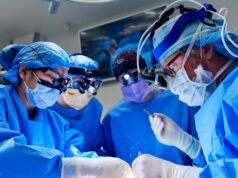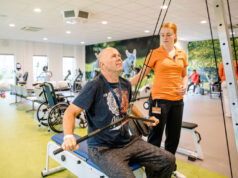 A recent attempted transplant of a genetically-edited pig kidney has been successfully carried out for the first time at Massachusetts General Hospital (MGH) in Boston, USA. The transplant team, led by Leonardo V Riella, Tatsuo Kawai, and Nahel Elias (all Massachusetts General Hospital, Boston, USA), transplanted the genetically-edited pig kidney with 69 genomic edits was successfully transplanted into a living patient after a four-hour-long surgery. The recipient of the transplant—Richard Slayman—a 62-year-old-man living with end-stage-kidney disease (ESKD), is recovering well and is expected to be discharged soon.
A recent attempted transplant of a genetically-edited pig kidney has been successfully carried out for the first time at Massachusetts General Hospital (MGH) in Boston, USA. The transplant team, led by Leonardo V Riella, Tatsuo Kawai, and Nahel Elias (all Massachusetts General Hospital, Boston, USA), transplanted the genetically-edited pig kidney with 69 genomic edits was successfully transplanted into a living patient after a four-hour-long surgery. The recipient of the transplant—Richard Slayman—a 62-year-old-man living with end-stage-kidney disease (ESKD), is recovering well and is expected to be discharged soon.
The genetically-edited pig kidney was provided by eGenesis. After five years of collaborative research between the company and MGH—the findings of which were published in Nature in 2023—eGenesis was able to provide a kidney from a pig donor that was genetically-edited using CRISPR-Cas9 technology to add certain human genes to improve its compatibility with the human recipient, as well as remove harmful pig genes. eGenesis also inactivated porcine endogenous retroviruses in the pig donor to eliminate any risk of infection in humans.
The US Food and Drug Administration (FDA) approved an expanded access protocol (EAP) for the transplantation in February 2024, along with an infusion of novel immunosuppressant drugs; tegoprubart, provided by Eledon Pharmaceuticals, and ravulizumab, provided by Alexion Pharmaceuticals.
As MGH stated in a press release about the transplantation, the procedure marks a “major milestone in the quest to provide more readily available organs to patients”.
The successful xenotransplantation of a genetically-edited pig kidney in a living recipient represents, as MGH phrased it in its press release, “a historic milestone” as a potential solution to the shortage of organs available for transplantation that is affecting the globe. They state that, according to the United Network for Organ Sharing (UNOS), more than 100,000 people in the USA await an organ for transplant, with 17 people dying each day whilst waiting for an organ. They also add that kidneys are the most common organ needed for transplant, and ESKD rates are estimated to increase 29–68 percent in the USA by 2030, according to research published in the Journal of the American Society of Nephrology.
The patient who received the transplant has been living with type-2 diabetes and hypertension for several years, and had previously received a human kidney transplant on December 2018, after undergoing dialysis for seven years prior to the transplantation. The transplanted organ began to show signs of failure after five years, leading to the patient resuming dialysis in May 2023, which lead to him experience recurrent dialysis vascular access complications that necessitated regular hospital visits for dialysis maintenance.
Slayman said in a statement: “I have been a Massachusetts General Transplant Center patient for 11 years and have the highest level of trust in the doctors, nurses, and clinical staff who have cared for me. When my transplanted kidney began failing in 2023, I again trusted my care team at MGH to meet my goals of not just improving my quality of life but extending it. My nephrologist, Winfred Williams, and the transplant centre team suggested a pig kidney transplant, carefully explaining the pros and cons of this procedure. I saw it not only as a way to help me, but a way to provide hope for the thousands of people who need a transplant to survive. I want to thank everyone at MGH who has cared for me, especially Williams, Kawai, the surgeon who performed my first kidney transplant and now this one, and Riella, who has orchestrated the logistics behind this new transplant. They have supported me during every step of the journey, and I have faith they will continue to do so.”
Commenting on the importance of the landmark procedure, Kawai stated: “The success of this transplant is the culmination of efforts by thousands of scientists and physicians over several decades. We are privileged to have played a significant role in this milestone. Our hope is that this transplant approach will offer a lifeline to millions of patients worldwide who are suffering from kidney failure”.
The transplant team made sure to highlight the importance of collaboration for the advancement of new treatments, with Elias saying that: “This seminal transplant could not be possible without collaboration and effort from multiple teams and specialists at MGH including physicians, surgeons, scientists, anaesthesiologists, and nurses. They participated in coordinating the patient’s care in preparation for the transplant, seeing him through the surgery, and caring for him post-operatively.”
Summarising what has been achieved by the transplant team, Riella said: “Seventy years after the first kidney transplant and six decades following the advent of immunosuppressive medications, we stand on the brink of a monumental breakthrough in transplantation. At MGH alone, there are over 1,400 patients on the waiting list for a kidney transplant. Some of these patients will unfortunately die or get too sick to be transplanted due to the long waiting time on dialysis. I am firmly convinced that xenotransplantation represents a promising solution to the organ shortage crisis.”












